Organisational Culture and Workforce Motivation - Unit 12 Report
VerifiedAdded on 2023/01/13
|19
|6352
|39
Report
AI Summary
This report provides a comprehensive analysis of organisational behaviour, focusing on Waitrose as a case study. It begins by examining the influence of organisational culture, politics, and power on individual and team behaviour, and performance. The report then delves into motivation theories, including content and process theories, and their application within the Waitrose context. The second part of the report explores the dynamics of effective and ineffective teams, with an analysis of relevant team and group development theories. Finally, the report applies concepts and philosophies of organisational behaviour to the Waitrose scenario, evaluating their impact on the organisation. The report incorporates critical analysis, evaluations, and recommendations throughout, drawing on relevant literature and theoretical frameworks to provide a thorough understanding of the subject matter.
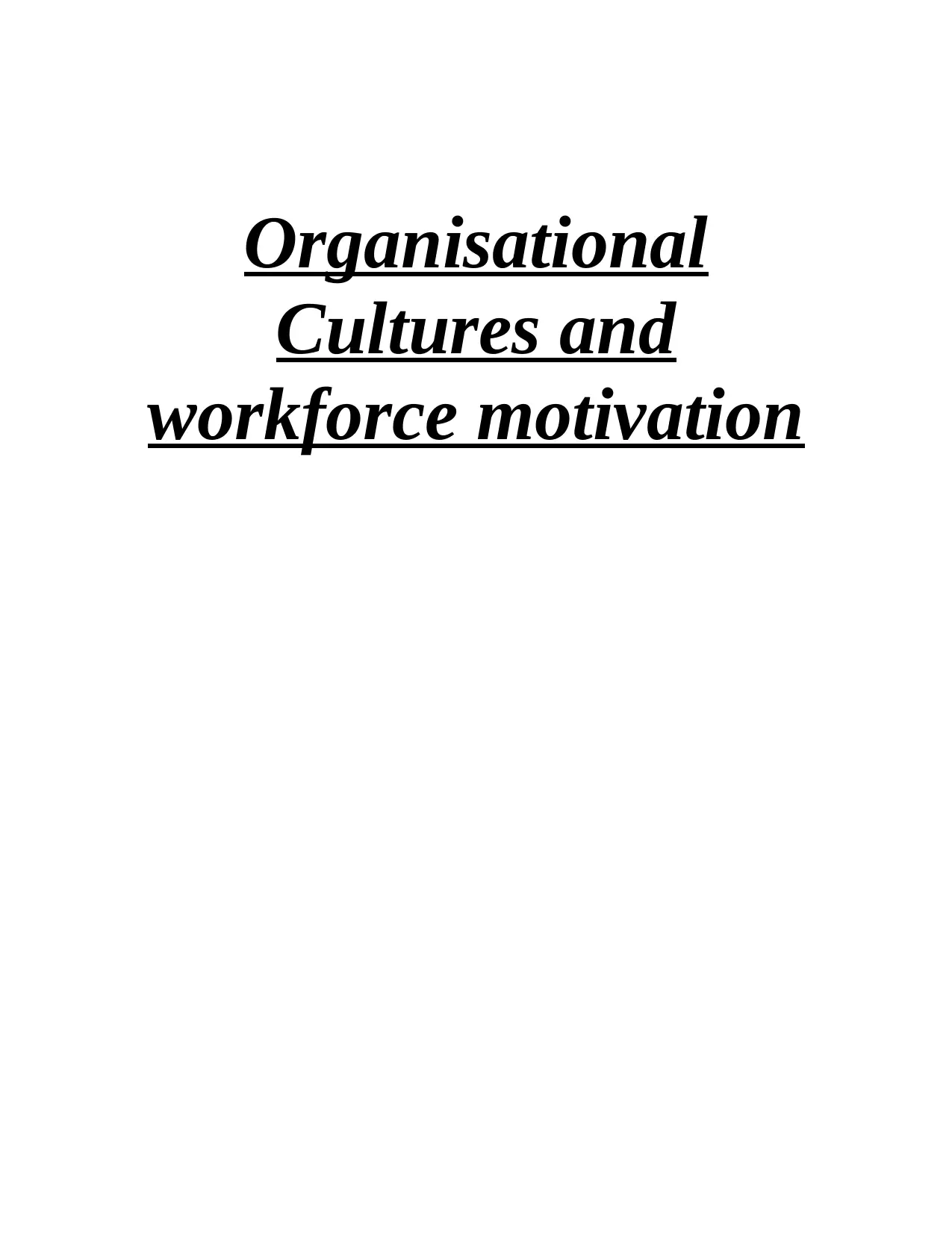
Organisational
Cultures and
workforce motivation
Cultures and
workforce motivation
Paraphrase This Document
Need a fresh take? Get an instant paraphrase of this document with our AI Paraphraser
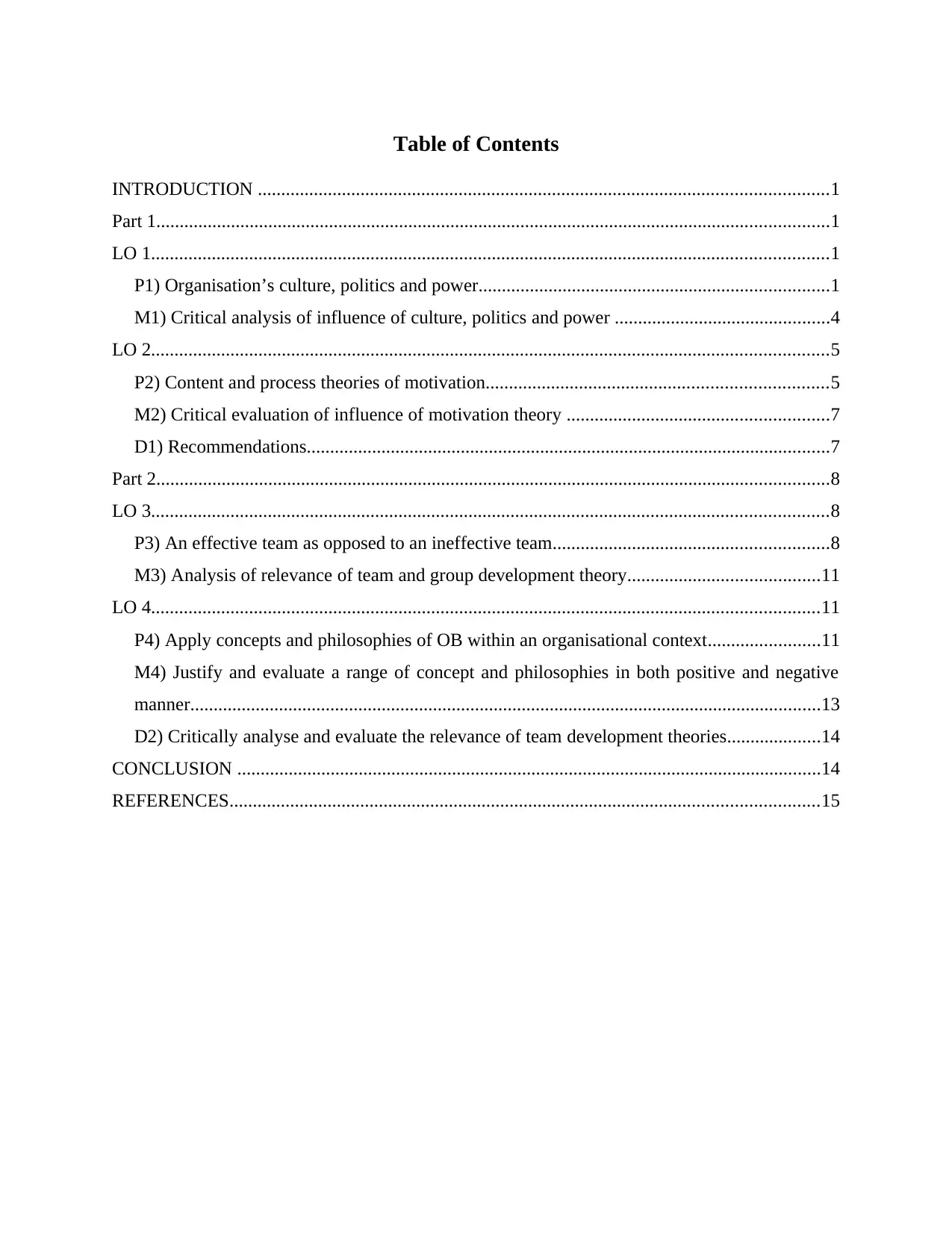
Table of Contents
INTRODUCTION ..........................................................................................................................1
Part 1................................................................................................................................................1
LO 1.................................................................................................................................................1
P1) Organisation’s culture, politics and power...........................................................................1
M1) Critical analysis of influence of culture, politics and power ..............................................4
LO 2.................................................................................................................................................5
P2) Content and process theories of motivation.........................................................................5
M2) Critical evaluation of influence of motivation theory ........................................................7
D1) Recommendations................................................................................................................7
Part 2................................................................................................................................................8
LO 3.................................................................................................................................................8
P3) An effective team as opposed to an ineffective team...........................................................8
M3) Analysis of relevance of team and group development theory.........................................11
LO 4...............................................................................................................................................11
P4) Apply concepts and philosophies of OB within an organisational context........................11
M4) Justify and evaluate a range of concept and philosophies in both positive and negative
manner.......................................................................................................................................13
D2) Critically analyse and evaluate the relevance of team development theories....................14
CONCLUSION .............................................................................................................................14
REFERENCES..............................................................................................................................15
INTRODUCTION ..........................................................................................................................1
Part 1................................................................................................................................................1
LO 1.................................................................................................................................................1
P1) Organisation’s culture, politics and power...........................................................................1
M1) Critical analysis of influence of culture, politics and power ..............................................4
LO 2.................................................................................................................................................5
P2) Content and process theories of motivation.........................................................................5
M2) Critical evaluation of influence of motivation theory ........................................................7
D1) Recommendations................................................................................................................7
Part 2................................................................................................................................................8
LO 3.................................................................................................................................................8
P3) An effective team as opposed to an ineffective team...........................................................8
M3) Analysis of relevance of team and group development theory.........................................11
LO 4...............................................................................................................................................11
P4) Apply concepts and philosophies of OB within an organisational context........................11
M4) Justify and evaluate a range of concept and philosophies in both positive and negative
manner.......................................................................................................................................13
D2) Critically analyse and evaluate the relevance of team development theories....................14
CONCLUSION .............................................................................................................................14
REFERENCES..............................................................................................................................15
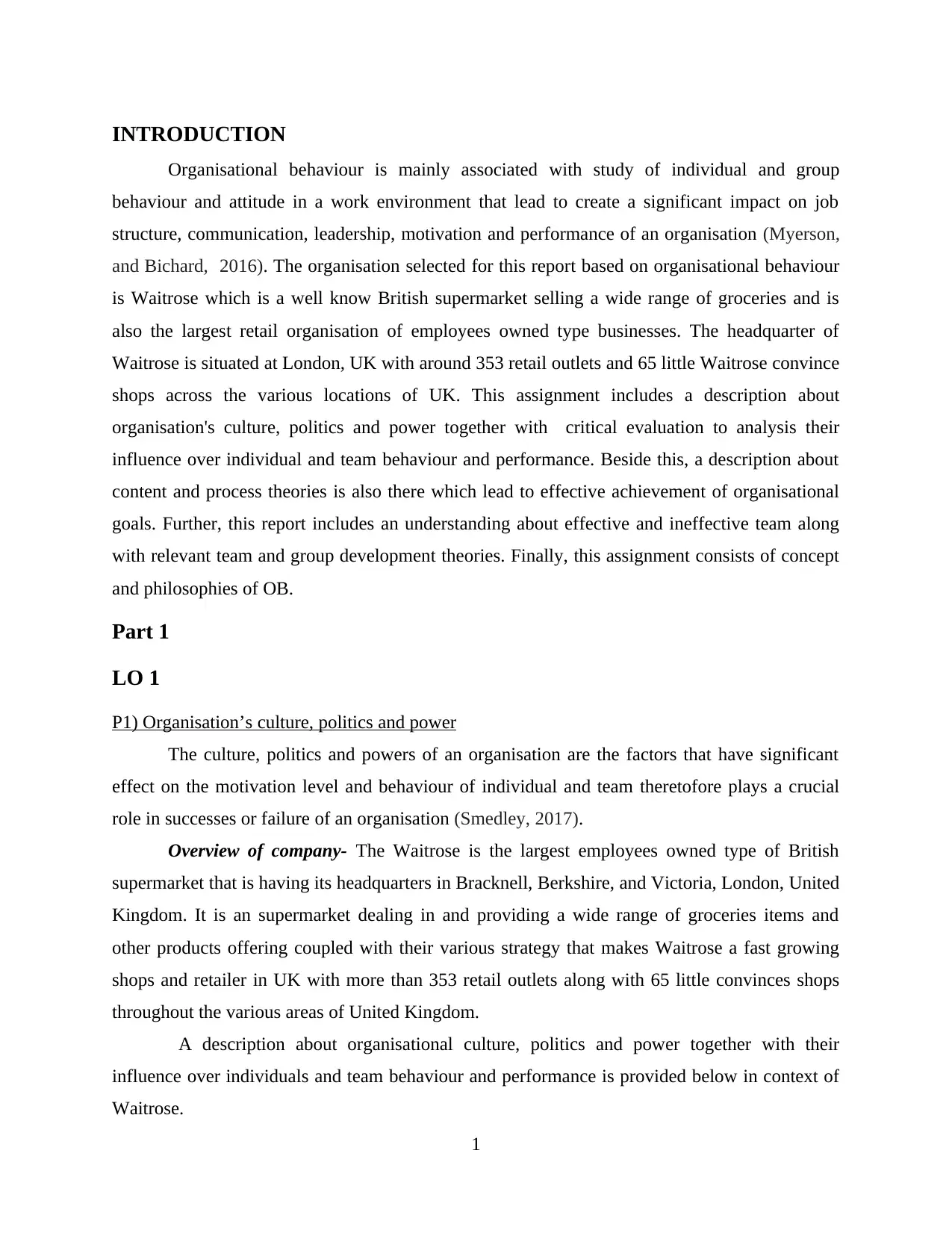
INTRODUCTION
Organisational behaviour is mainly associated with study of individual and group
behaviour and attitude in a work environment that lead to create a significant impact on job
structure, communication, leadership, motivation and performance of an organisation (Myerson,
and Bichard, 2016). The organisation selected for this report based on organisational behaviour
is Waitrose which is a well know British supermarket selling a wide range of groceries and is
also the largest retail organisation of employees owned type businesses. The headquarter of
Waitrose is situated at London, UK with around 353 retail outlets and 65 little Waitrose convince
shops across the various locations of UK. This assignment includes a description about
organisation's culture, politics and power together with critical evaluation to analysis their
influence over individual and team behaviour and performance. Beside this, a description about
content and process theories is also there which lead to effective achievement of organisational
goals. Further, this report includes an understanding about effective and ineffective team along
with relevant team and group development theories. Finally, this assignment consists of concept
and philosophies of OB.
Part 1
LO 1
P1) Organisation’s culture, politics and power
The culture, politics and powers of an organisation are the factors that have significant
effect on the motivation level and behaviour of individual and team theretofore plays a crucial
role in successes or failure of an organisation (Smedley, 2017).
Overview of company- The Waitrose is the largest employees owned type of British
supermarket that is having its headquarters in Bracknell, Berkshire, and Victoria, London, United
Kingdom. It is an supermarket dealing in and providing a wide range of groceries items and
other products offering coupled with their various strategy that makes Waitrose a fast growing
shops and retailer in UK with more than 353 retail outlets along with 65 little convinces shops
throughout the various areas of United Kingdom.
A description about organisational culture, politics and power together with their
influence over individuals and team behaviour and performance is provided below in context of
Waitrose.
1
Organisational behaviour is mainly associated with study of individual and group
behaviour and attitude in a work environment that lead to create a significant impact on job
structure, communication, leadership, motivation and performance of an organisation (Myerson,
and Bichard, 2016). The organisation selected for this report based on organisational behaviour
is Waitrose which is a well know British supermarket selling a wide range of groceries and is
also the largest retail organisation of employees owned type businesses. The headquarter of
Waitrose is situated at London, UK with around 353 retail outlets and 65 little Waitrose convince
shops across the various locations of UK. This assignment includes a description about
organisation's culture, politics and power together with critical evaluation to analysis their
influence over individual and team behaviour and performance. Beside this, a description about
content and process theories is also there which lead to effective achievement of organisational
goals. Further, this report includes an understanding about effective and ineffective team along
with relevant team and group development theories. Finally, this assignment consists of concept
and philosophies of OB.
Part 1
LO 1
P1) Organisation’s culture, politics and power
The culture, politics and powers of an organisation are the factors that have significant
effect on the motivation level and behaviour of individual and team theretofore plays a crucial
role in successes or failure of an organisation (Smedley, 2017).
Overview of company- The Waitrose is the largest employees owned type of British
supermarket that is having its headquarters in Bracknell, Berkshire, and Victoria, London, United
Kingdom. It is an supermarket dealing in and providing a wide range of groceries items and
other products offering coupled with their various strategy that makes Waitrose a fast growing
shops and retailer in UK with more than 353 retail outlets along with 65 little convinces shops
throughout the various areas of United Kingdom.
A description about organisational culture, politics and power together with their
influence over individuals and team behaviour and performance is provided below in context of
Waitrose.
1
⊘ This is a preview!⊘
Do you want full access?
Subscribe today to unlock all pages.

Trusted by 1+ million students worldwide
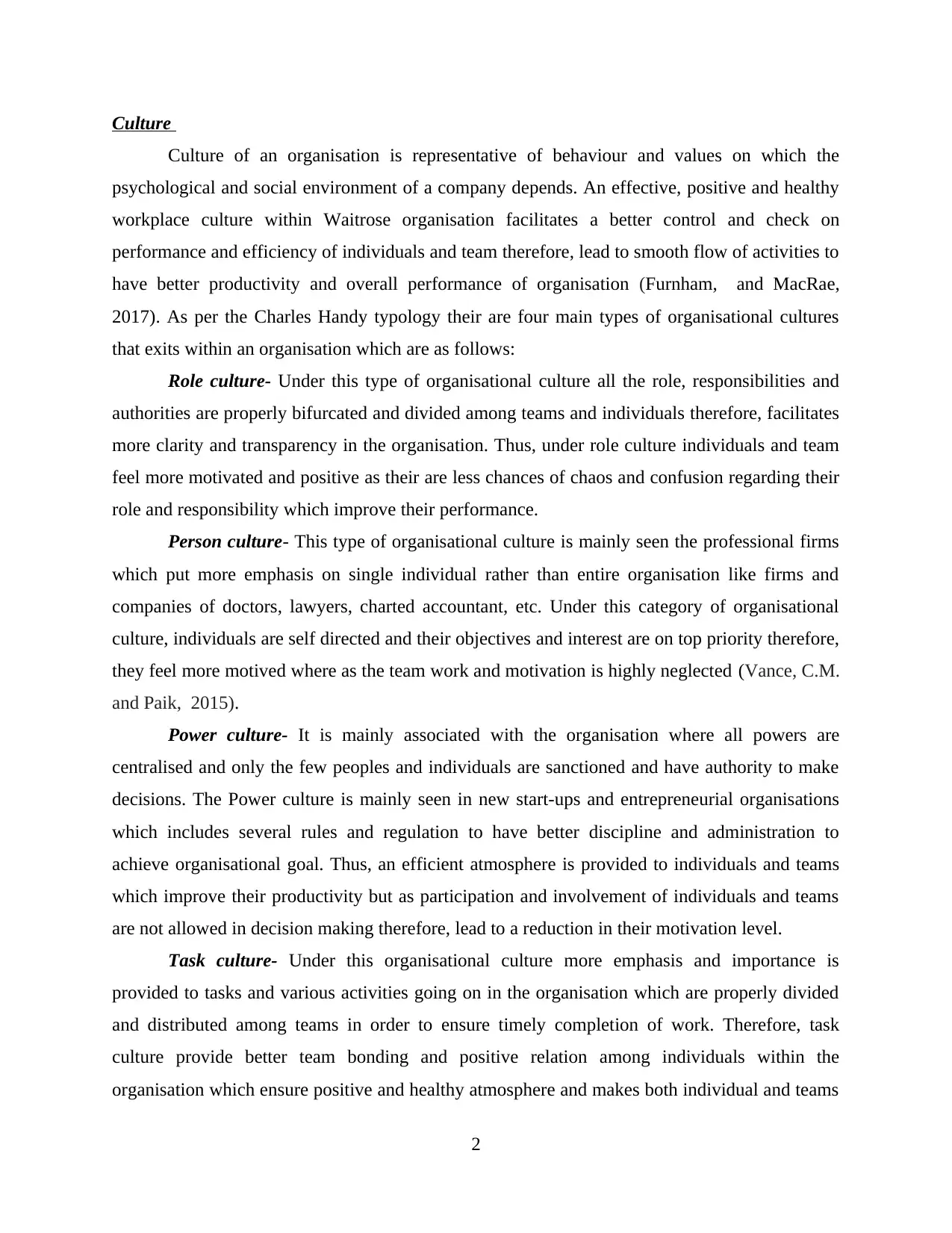
Culture
Culture of an organisation is representative of behaviour and values on which the
psychological and social environment of a company depends. An effective, positive and healthy
workplace culture within Waitrose organisation facilitates a better control and check on
performance and efficiency of individuals and team therefore, lead to smooth flow of activities to
have better productivity and overall performance of organisation (Furnham, and MacRae,
2017). As per the Charles Handy typology their are four main types of organisational cultures
that exits within an organisation which are as follows:
Role culture- Under this type of organisational culture all the role, responsibilities and
authorities are properly bifurcated and divided among teams and individuals therefore, facilitates
more clarity and transparency in the organisation. Thus, under role culture individuals and team
feel more motivated and positive as their are less chances of chaos and confusion regarding their
role and responsibility which improve their performance.
Person culture- This type of organisational culture is mainly seen the professional firms
which put more emphasis on single individual rather than entire organisation like firms and
companies of doctors, lawyers, charted accountant, etc. Under this category of organisational
culture, individuals are self directed and their objectives and interest are on top priority therefore,
they feel more motived where as the team work and motivation is highly neglected (Vance, C.M.
and Paik, 2015).
Power culture- It is mainly associated with the organisation where all powers are
centralised and only the few peoples and individuals are sanctioned and have authority to make
decisions. The Power culture is mainly seen in new start-ups and entrepreneurial organisations
which includes several rules and regulation to have better discipline and administration to
achieve organisational goal. Thus, an efficient atmosphere is provided to individuals and teams
which improve their productivity but as participation and involvement of individuals and teams
are not allowed in decision making therefore, lead to a reduction in their motivation level.
Task culture- Under this organisational culture more emphasis and importance is
provided to tasks and various activities going on in the organisation which are properly divided
and distributed among teams in order to ensure timely completion of work. Therefore, task
culture provide better team bonding and positive relation among individuals within the
organisation which ensure positive and healthy atmosphere and makes both individual and teams
2
Culture of an organisation is representative of behaviour and values on which the
psychological and social environment of a company depends. An effective, positive and healthy
workplace culture within Waitrose organisation facilitates a better control and check on
performance and efficiency of individuals and team therefore, lead to smooth flow of activities to
have better productivity and overall performance of organisation (Furnham, and MacRae,
2017). As per the Charles Handy typology their are four main types of organisational cultures
that exits within an organisation which are as follows:
Role culture- Under this type of organisational culture all the role, responsibilities and
authorities are properly bifurcated and divided among teams and individuals therefore, facilitates
more clarity and transparency in the organisation. Thus, under role culture individuals and team
feel more motivated and positive as their are less chances of chaos and confusion regarding their
role and responsibility which improve their performance.
Person culture- This type of organisational culture is mainly seen the professional firms
which put more emphasis on single individual rather than entire organisation like firms and
companies of doctors, lawyers, charted accountant, etc. Under this category of organisational
culture, individuals are self directed and their objectives and interest are on top priority therefore,
they feel more motived where as the team work and motivation is highly neglected (Vance, C.M.
and Paik, 2015).
Power culture- It is mainly associated with the organisation where all powers are
centralised and only the few peoples and individuals are sanctioned and have authority to make
decisions. The Power culture is mainly seen in new start-ups and entrepreneurial organisations
which includes several rules and regulation to have better discipline and administration to
achieve organisational goal. Thus, an efficient atmosphere is provided to individuals and teams
which improve their productivity but as participation and involvement of individuals and teams
are not allowed in decision making therefore, lead to a reduction in their motivation level.
Task culture- Under this organisational culture more emphasis and importance is
provided to tasks and various activities going on in the organisation which are properly divided
and distributed among teams in order to ensure timely completion of work. Therefore, task
culture provide better team bonding and positive relation among individuals within the
organisation which ensure positive and healthy atmosphere and makes both individual and teams
2
Paraphrase This Document
Need a fresh take? Get an instant paraphrase of this document with our AI Paraphraser
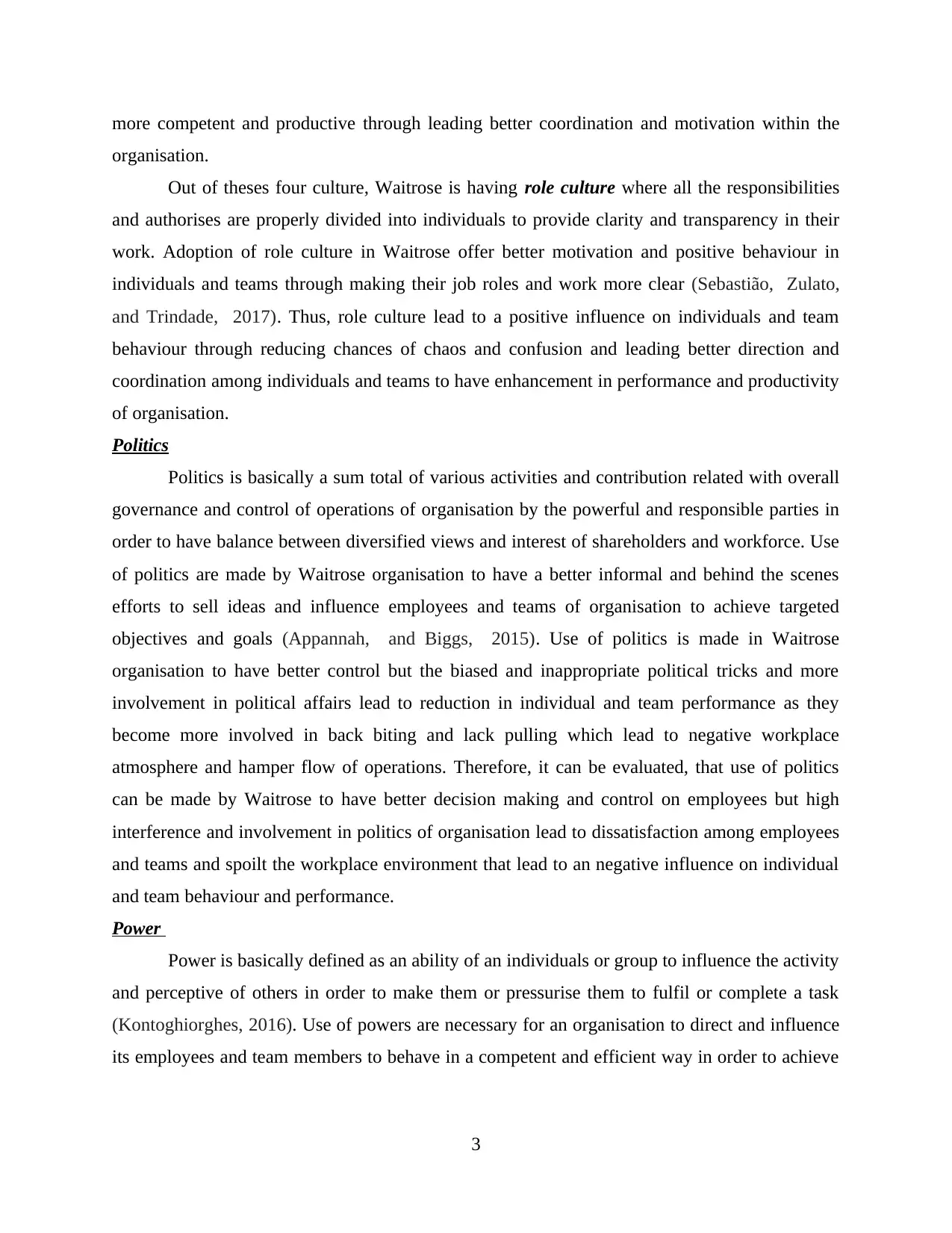
more competent and productive through leading better coordination and motivation within the
organisation.
Out of theses four culture, Waitrose is having role culture where all the responsibilities
and authorises are properly divided into individuals to provide clarity and transparency in their
work. Adoption of role culture in Waitrose offer better motivation and positive behaviour in
individuals and teams through making their job roles and work more clear (Sebastião, Zulato,
and Trindade, 2017). Thus, role culture lead to a positive influence on individuals and team
behaviour through reducing chances of chaos and confusion and leading better direction and
coordination among individuals and teams to have enhancement in performance and productivity
of organisation.
Politics
Politics is basically a sum total of various activities and contribution related with overall
governance and control of operations of organisation by the powerful and responsible parties in
order to have balance between diversified views and interest of shareholders and workforce. Use
of politics are made by Waitrose organisation to have a better informal and behind the scenes
efforts to sell ideas and influence employees and teams of organisation to achieve targeted
objectives and goals (Appannah, and Biggs, 2015). Use of politics is made in Waitrose
organisation to have better control but the biased and inappropriate political tricks and more
involvement in political affairs lead to reduction in individual and team performance as they
become more involved in back biting and lack pulling which lead to negative workplace
atmosphere and hamper flow of operations. Therefore, it can be evaluated, that use of politics
can be made by Waitrose to have better decision making and control on employees but high
interference and involvement in politics of organisation lead to dissatisfaction among employees
and teams and spoilt the workplace environment that lead to an negative influence on individual
and team behaviour and performance.
Power
Power is basically defined as an ability of an individuals or group to influence the activity
and perceptive of others in order to make them or pressurise them to fulfil or complete a task
(Kontoghiorghes, 2016). Use of powers are necessary for an organisation to direct and influence
its employees and team members to behave in a competent and efficient way in order to achieve
3
organisation.
Out of theses four culture, Waitrose is having role culture where all the responsibilities
and authorises are properly divided into individuals to provide clarity and transparency in their
work. Adoption of role culture in Waitrose offer better motivation and positive behaviour in
individuals and teams through making their job roles and work more clear (Sebastião, Zulato,
and Trindade, 2017). Thus, role culture lead to a positive influence on individuals and team
behaviour through reducing chances of chaos and confusion and leading better direction and
coordination among individuals and teams to have enhancement in performance and productivity
of organisation.
Politics
Politics is basically a sum total of various activities and contribution related with overall
governance and control of operations of organisation by the powerful and responsible parties in
order to have balance between diversified views and interest of shareholders and workforce. Use
of politics are made by Waitrose organisation to have a better informal and behind the scenes
efforts to sell ideas and influence employees and teams of organisation to achieve targeted
objectives and goals (Appannah, and Biggs, 2015). Use of politics is made in Waitrose
organisation to have better control but the biased and inappropriate political tricks and more
involvement in political affairs lead to reduction in individual and team performance as they
become more involved in back biting and lack pulling which lead to negative workplace
atmosphere and hamper flow of operations. Therefore, it can be evaluated, that use of politics
can be made by Waitrose to have better decision making and control on employees but high
interference and involvement in politics of organisation lead to dissatisfaction among employees
and teams and spoilt the workplace environment that lead to an negative influence on individual
and team behaviour and performance.
Power
Power is basically defined as an ability of an individuals or group to influence the activity
and perceptive of others in order to make them or pressurise them to fulfil or complete a task
(Kontoghiorghes, 2016). Use of powers are necessary for an organisation to direct and influence
its employees and team members to behave in a competent and efficient way in order to achieve
3
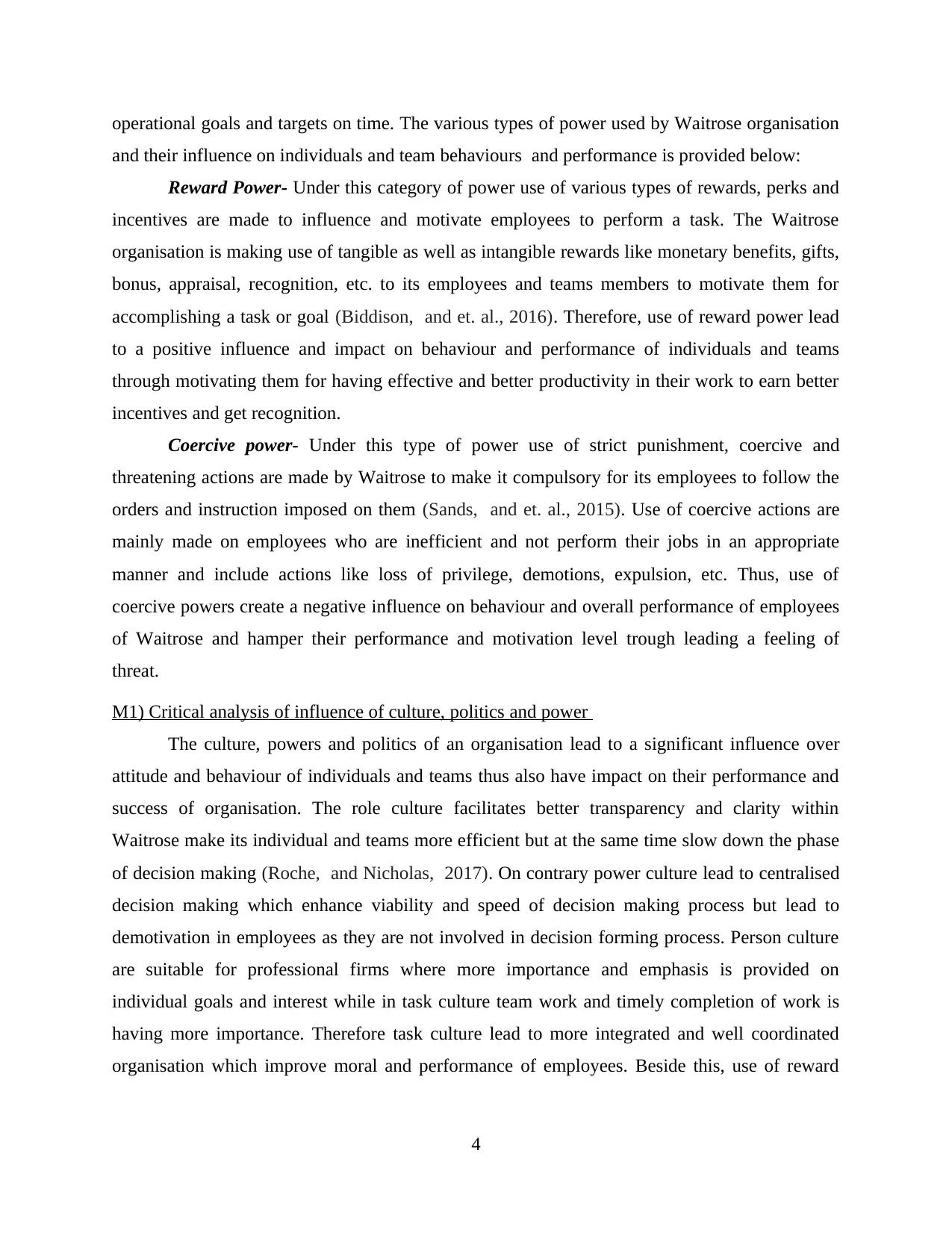
operational goals and targets on time. The various types of power used by Waitrose organisation
and their influence on individuals and team behaviours and performance is provided below:
Reward Power- Under this category of power use of various types of rewards, perks and
incentives are made to influence and motivate employees to perform a task. The Waitrose
organisation is making use of tangible as well as intangible rewards like monetary benefits, gifts,
bonus, appraisal, recognition, etc. to its employees and teams members to motivate them for
accomplishing a task or goal (Biddison, and et. al., 2016). Therefore, use of reward power lead
to a positive influence and impact on behaviour and performance of individuals and teams
through motivating them for having effective and better productivity in their work to earn better
incentives and get recognition.
Coercive power- Under this type of power use of strict punishment, coercive and
threatening actions are made by Waitrose to make it compulsory for its employees to follow the
orders and instruction imposed on them (Sands, and et. al., 2015). Use of coercive actions are
mainly made on employees who are inefficient and not perform their jobs in an appropriate
manner and include actions like loss of privilege, demotions, expulsion, etc. Thus, use of
coercive powers create a negative influence on behaviour and overall performance of employees
of Waitrose and hamper their performance and motivation level trough leading a feeling of
threat.
M1) Critical analysis of influence of culture, politics and power
The culture, powers and politics of an organisation lead to a significant influence over
attitude and behaviour of individuals and teams thus also have impact on their performance and
success of organisation. The role culture facilitates better transparency and clarity within
Waitrose make its individual and teams more efficient but at the same time slow down the phase
of decision making (Roche, and Nicholas, 2017). On contrary power culture lead to centralised
decision making which enhance viability and speed of decision making process but lead to
demotivation in employees as they are not involved in decision forming process. Person culture
are suitable for professional firms where more importance and emphasis is provided on
individual goals and interest while in task culture team work and timely completion of work is
having more importance. Therefore task culture lead to more integrated and well coordinated
organisation which improve moral and performance of employees. Beside this, use of reward
4
and their influence on individuals and team behaviours and performance is provided below:
Reward Power- Under this category of power use of various types of rewards, perks and
incentives are made to influence and motivate employees to perform a task. The Waitrose
organisation is making use of tangible as well as intangible rewards like monetary benefits, gifts,
bonus, appraisal, recognition, etc. to its employees and teams members to motivate them for
accomplishing a task or goal (Biddison, and et. al., 2016). Therefore, use of reward power lead
to a positive influence and impact on behaviour and performance of individuals and teams
through motivating them for having effective and better productivity in their work to earn better
incentives and get recognition.
Coercive power- Under this type of power use of strict punishment, coercive and
threatening actions are made by Waitrose to make it compulsory for its employees to follow the
orders and instruction imposed on them (Sands, and et. al., 2015). Use of coercive actions are
mainly made on employees who are inefficient and not perform their jobs in an appropriate
manner and include actions like loss of privilege, demotions, expulsion, etc. Thus, use of
coercive powers create a negative influence on behaviour and overall performance of employees
of Waitrose and hamper their performance and motivation level trough leading a feeling of
threat.
M1) Critical analysis of influence of culture, politics and power
The culture, powers and politics of an organisation lead to a significant influence over
attitude and behaviour of individuals and teams thus also have impact on their performance and
success of organisation. The role culture facilitates better transparency and clarity within
Waitrose make its individual and teams more efficient but at the same time slow down the phase
of decision making (Roche, and Nicholas, 2017). On contrary power culture lead to centralised
decision making which enhance viability and speed of decision making process but lead to
demotivation in employees as they are not involved in decision forming process. Person culture
are suitable for professional firms where more importance and emphasis is provided on
individual goals and interest while in task culture team work and timely completion of work is
having more importance. Therefore task culture lead to more integrated and well coordinated
organisation which improve moral and performance of employees. Beside this, use of reward
4
⊘ This is a preview!⊘
Do you want full access?
Subscribe today to unlock all pages.

Trusted by 1+ million students worldwide
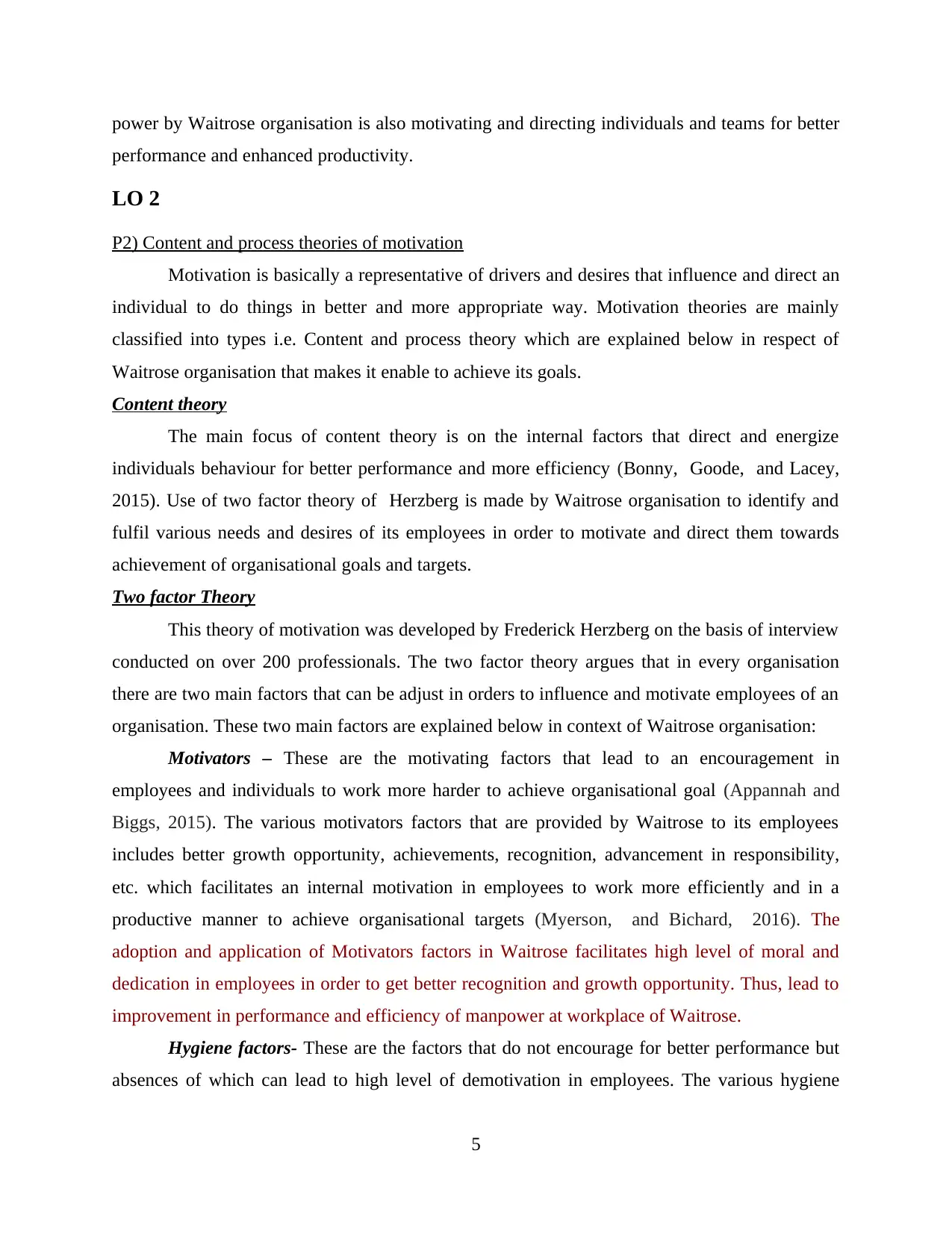
power by Waitrose organisation is also motivating and directing individuals and teams for better
performance and enhanced productivity.
LO 2
P2) Content and process theories of motivation
Motivation is basically a representative of drivers and desires that influence and direct an
individual to do things in better and more appropriate way. Motivation theories are mainly
classified into types i.e. Content and process theory which are explained below in respect of
Waitrose organisation that makes it enable to achieve its goals.
Content theory
The main focus of content theory is on the internal factors that direct and energize
individuals behaviour for better performance and more efficiency (Bonny, Goode, and Lacey,
2015). Use of two factor theory of Herzberg is made by Waitrose organisation to identify and
fulfil various needs and desires of its employees in order to motivate and direct them towards
achievement of organisational goals and targets.
Two factor Theory
This theory of motivation was developed by Frederick Herzberg on the basis of interview
conducted on over 200 professionals. The two factor theory argues that in every organisation
there are two main factors that can be adjust in orders to influence and motivate employees of an
organisation. These two main factors are explained below in context of Waitrose organisation:
Motivators – These are the motivating factors that lead to an encouragement in
employees and individuals to work more harder to achieve organisational goal (Appannah and
Biggs, 2015). The various motivators factors that are provided by Waitrose to its employees
includes better growth opportunity, achievements, recognition, advancement in responsibility,
etc. which facilitates an internal motivation in employees to work more efficiently and in a
productive manner to achieve organisational targets (Myerson, and Bichard, 2016). The
adoption and application of Motivators factors in Waitrose facilitates high level of moral and
dedication in employees in order to get better recognition and growth opportunity. Thus, lead to
improvement in performance and efficiency of manpower at workplace of Waitrose.
Hygiene factors- These are the factors that do not encourage for better performance but
absences of which can lead to high level of demotivation in employees. The various hygiene
5
performance and enhanced productivity.
LO 2
P2) Content and process theories of motivation
Motivation is basically a representative of drivers and desires that influence and direct an
individual to do things in better and more appropriate way. Motivation theories are mainly
classified into types i.e. Content and process theory which are explained below in respect of
Waitrose organisation that makes it enable to achieve its goals.
Content theory
The main focus of content theory is on the internal factors that direct and energize
individuals behaviour for better performance and more efficiency (Bonny, Goode, and Lacey,
2015). Use of two factor theory of Herzberg is made by Waitrose organisation to identify and
fulfil various needs and desires of its employees in order to motivate and direct them towards
achievement of organisational goals and targets.
Two factor Theory
This theory of motivation was developed by Frederick Herzberg on the basis of interview
conducted on over 200 professionals. The two factor theory argues that in every organisation
there are two main factors that can be adjust in orders to influence and motivate employees of an
organisation. These two main factors are explained below in context of Waitrose organisation:
Motivators – These are the motivating factors that lead to an encouragement in
employees and individuals to work more harder to achieve organisational goal (Appannah and
Biggs, 2015). The various motivators factors that are provided by Waitrose to its employees
includes better growth opportunity, achievements, recognition, advancement in responsibility,
etc. which facilitates an internal motivation in employees to work more efficiently and in a
productive manner to achieve organisational targets (Myerson, and Bichard, 2016). The
adoption and application of Motivators factors in Waitrose facilitates high level of moral and
dedication in employees in order to get better recognition and growth opportunity. Thus, lead to
improvement in performance and efficiency of manpower at workplace of Waitrose.
Hygiene factors- These are the factors that do not encourage for better performance but
absences of which can lead to high level of demotivation in employees. The various hygiene
5
Paraphrase This Document
Need a fresh take? Get an instant paraphrase of this document with our AI Paraphraser
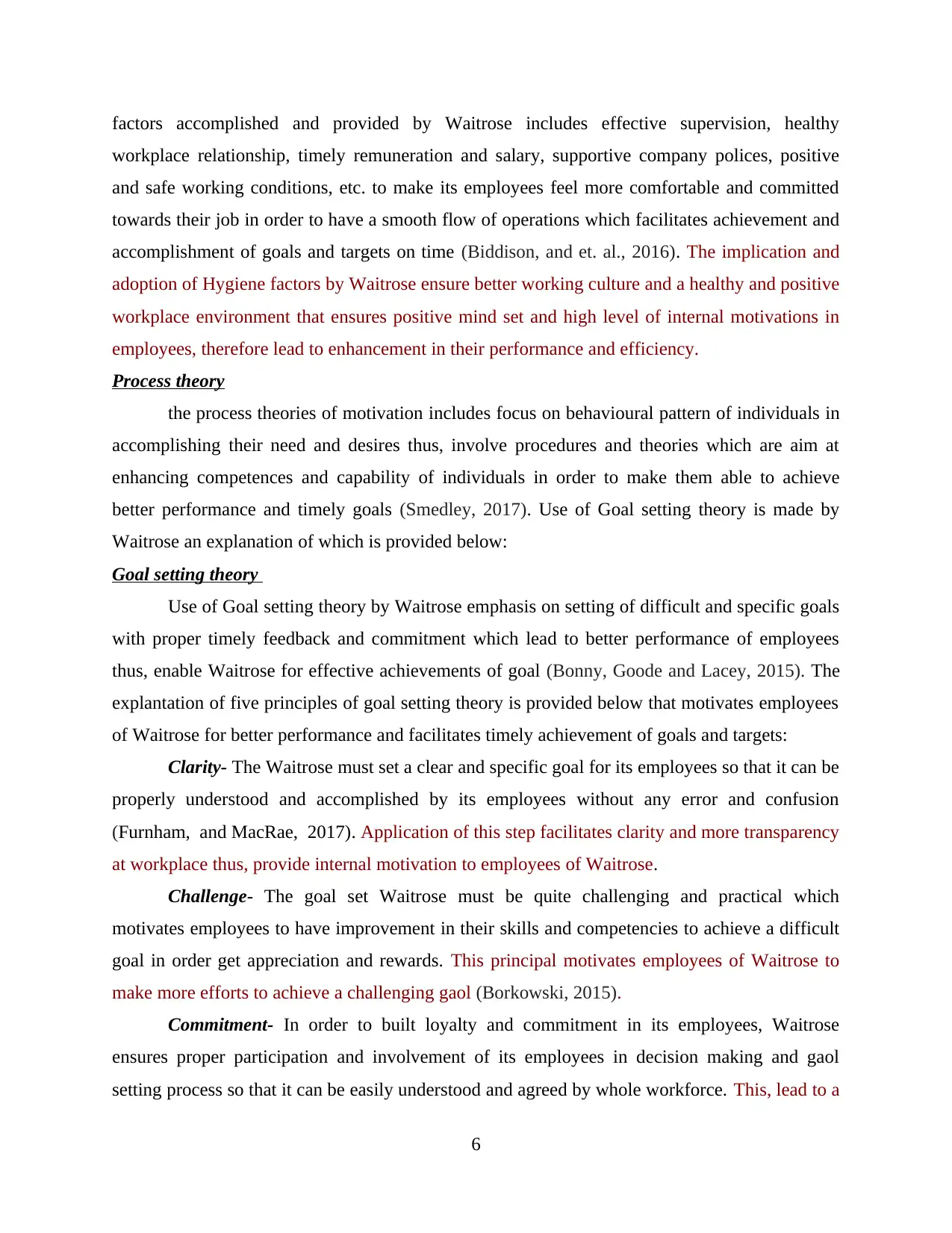
factors accomplished and provided by Waitrose includes effective supervision, healthy
workplace relationship, timely remuneration and salary, supportive company polices, positive
and safe working conditions, etc. to make its employees feel more comfortable and committed
towards their job in order to have a smooth flow of operations which facilitates achievement and
accomplishment of goals and targets on time (Biddison, and et. al., 2016). The implication and
adoption of Hygiene factors by Waitrose ensure better working culture and a healthy and positive
workplace environment that ensures positive mind set and high level of internal motivations in
employees, therefore lead to enhancement in their performance and efficiency.
Process theory
the process theories of motivation includes focus on behavioural pattern of individuals in
accomplishing their need and desires thus, involve procedures and theories which are aim at
enhancing competences and capability of individuals in order to make them able to achieve
better performance and timely goals (Smedley, 2017). Use of Goal setting theory is made by
Waitrose an explanation of which is provided below:
Goal setting theory
Use of Goal setting theory by Waitrose emphasis on setting of difficult and specific goals
with proper timely feedback and commitment which lead to better performance of employees
thus, enable Waitrose for effective achievements of goal (Bonny, Goode and Lacey, 2015). The
explantation of five principles of goal setting theory is provided below that motivates employees
of Waitrose for better performance and facilitates timely achievement of goals and targets:
Clarity- The Waitrose must set a clear and specific goal for its employees so that it can be
properly understood and accomplished by its employees without any error and confusion
(Furnham, and MacRae, 2017). Application of this step facilitates clarity and more transparency
at workplace thus, provide internal motivation to employees of Waitrose.
Challenge- The goal set Waitrose must be quite challenging and practical which
motivates employees to have improvement in their skills and competencies to achieve a difficult
goal in order get appreciation and rewards. This principal motivates employees of Waitrose to
make more efforts to achieve a challenging gaol (Borkowski, 2015).
Commitment- In order to built loyalty and commitment in its employees, Waitrose
ensures proper participation and involvement of its employees in decision making and gaol
setting process so that it can be easily understood and agreed by whole workforce. This, lead to a
6
workplace relationship, timely remuneration and salary, supportive company polices, positive
and safe working conditions, etc. to make its employees feel more comfortable and committed
towards their job in order to have a smooth flow of operations which facilitates achievement and
accomplishment of goals and targets on time (Biddison, and et. al., 2016). The implication and
adoption of Hygiene factors by Waitrose ensure better working culture and a healthy and positive
workplace environment that ensures positive mind set and high level of internal motivations in
employees, therefore lead to enhancement in their performance and efficiency.
Process theory
the process theories of motivation includes focus on behavioural pattern of individuals in
accomplishing their need and desires thus, involve procedures and theories which are aim at
enhancing competences and capability of individuals in order to make them able to achieve
better performance and timely goals (Smedley, 2017). Use of Goal setting theory is made by
Waitrose an explanation of which is provided below:
Goal setting theory
Use of Goal setting theory by Waitrose emphasis on setting of difficult and specific goals
with proper timely feedback and commitment which lead to better performance of employees
thus, enable Waitrose for effective achievements of goal (Bonny, Goode and Lacey, 2015). The
explantation of five principles of goal setting theory is provided below that motivates employees
of Waitrose for better performance and facilitates timely achievement of goals and targets:
Clarity- The Waitrose must set a clear and specific goal for its employees so that it can be
properly understood and accomplished by its employees without any error and confusion
(Furnham, and MacRae, 2017). Application of this step facilitates clarity and more transparency
at workplace thus, provide internal motivation to employees of Waitrose.
Challenge- The goal set Waitrose must be quite challenging and practical which
motivates employees to have improvement in their skills and competencies to achieve a difficult
goal in order get appreciation and rewards. This principal motivates employees of Waitrose to
make more efforts to achieve a challenging gaol (Borkowski, 2015).
Commitment- In order to built loyalty and commitment in its employees, Waitrose
ensures proper participation and involvement of its employees in decision making and gaol
setting process so that it can be easily understood and agreed by whole workforce. This, lead to a
6
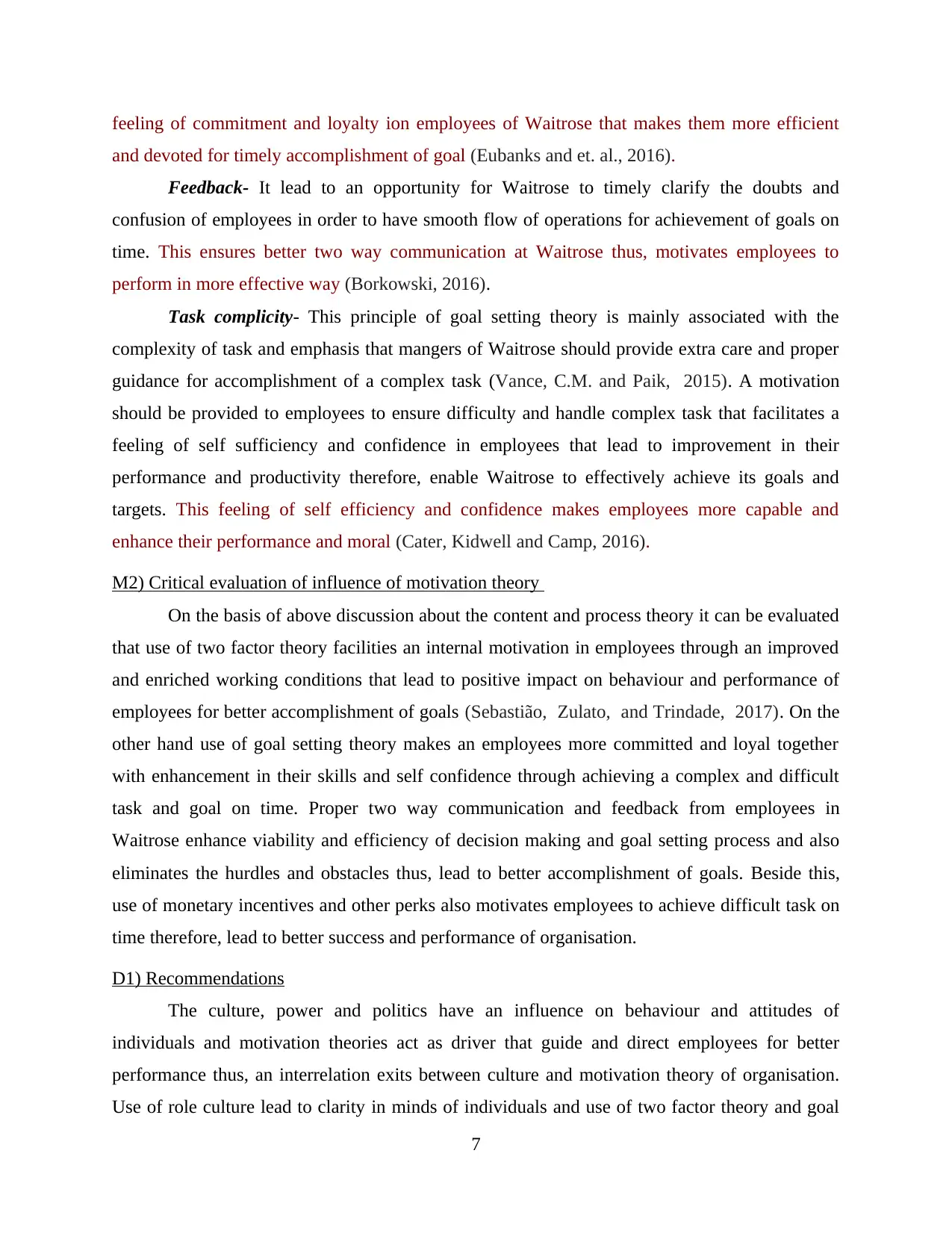
feeling of commitment and loyalty ion employees of Waitrose that makes them more efficient
and devoted for timely accomplishment of goal (Eubanks and et. al., 2016).
Feedback- It lead to an opportunity for Waitrose to timely clarify the doubts and
confusion of employees in order to have smooth flow of operations for achievement of goals on
time. This ensures better two way communication at Waitrose thus, motivates employees to
perform in more effective way (Borkowski, 2016).
Task complicity- This principle of goal setting theory is mainly associated with the
complexity of task and emphasis that mangers of Waitrose should provide extra care and proper
guidance for accomplishment of a complex task (Vance, C.M. and Paik, 2015). A motivation
should be provided to employees to ensure difficulty and handle complex task that facilitates a
feeling of self sufficiency and confidence in employees that lead to improvement in their
performance and productivity therefore, enable Waitrose to effectively achieve its goals and
targets. This feeling of self efficiency and confidence makes employees more capable and
enhance their performance and moral (Cater, Kidwell and Camp, 2016).
M2) Critical evaluation of influence of motivation theory
On the basis of above discussion about the content and process theory it can be evaluated
that use of two factor theory facilities an internal motivation in employees through an improved
and enriched working conditions that lead to positive impact on behaviour and performance of
employees for better accomplishment of goals (Sebastião, Zulato, and Trindade, 2017). On the
other hand use of goal setting theory makes an employees more committed and loyal together
with enhancement in their skills and self confidence through achieving a complex and difficult
task and goal on time. Proper two way communication and feedback from employees in
Waitrose enhance viability and efficiency of decision making and goal setting process and also
eliminates the hurdles and obstacles thus, lead to better accomplishment of goals. Beside this,
use of monetary incentives and other perks also motivates employees to achieve difficult task on
time therefore, lead to better success and performance of organisation.
D1) Recommendations
The culture, power and politics have an influence on behaviour and attitudes of
individuals and motivation theories act as driver that guide and direct employees for better
performance thus, an interrelation exits between culture and motivation theory of organisation.
Use of role culture lead to clarity in minds of individuals and use of two factor theory and goal
7
and devoted for timely accomplishment of goal (Eubanks and et. al., 2016).
Feedback- It lead to an opportunity for Waitrose to timely clarify the doubts and
confusion of employees in order to have smooth flow of operations for achievement of goals on
time. This ensures better two way communication at Waitrose thus, motivates employees to
perform in more effective way (Borkowski, 2016).
Task complicity- This principle of goal setting theory is mainly associated with the
complexity of task and emphasis that mangers of Waitrose should provide extra care and proper
guidance for accomplishment of a complex task (Vance, C.M. and Paik, 2015). A motivation
should be provided to employees to ensure difficulty and handle complex task that facilitates a
feeling of self sufficiency and confidence in employees that lead to improvement in their
performance and productivity therefore, enable Waitrose to effectively achieve its goals and
targets. This feeling of self efficiency and confidence makes employees more capable and
enhance their performance and moral (Cater, Kidwell and Camp, 2016).
M2) Critical evaluation of influence of motivation theory
On the basis of above discussion about the content and process theory it can be evaluated
that use of two factor theory facilities an internal motivation in employees through an improved
and enriched working conditions that lead to positive impact on behaviour and performance of
employees for better accomplishment of goals (Sebastião, Zulato, and Trindade, 2017). On the
other hand use of goal setting theory makes an employees more committed and loyal together
with enhancement in their skills and self confidence through achieving a complex and difficult
task and goal on time. Proper two way communication and feedback from employees in
Waitrose enhance viability and efficiency of decision making and goal setting process and also
eliminates the hurdles and obstacles thus, lead to better accomplishment of goals. Beside this,
use of monetary incentives and other perks also motivates employees to achieve difficult task on
time therefore, lead to better success and performance of organisation.
D1) Recommendations
The culture, power and politics have an influence on behaviour and attitudes of
individuals and motivation theories act as driver that guide and direct employees for better
performance thus, an interrelation exits between culture and motivation theory of organisation.
Use of role culture lead to clarity in minds of individuals and use of two factor theory and goal
7
⊘ This is a preview!⊘
Do you want full access?
Subscribe today to unlock all pages.

Trusted by 1+ million students worldwide
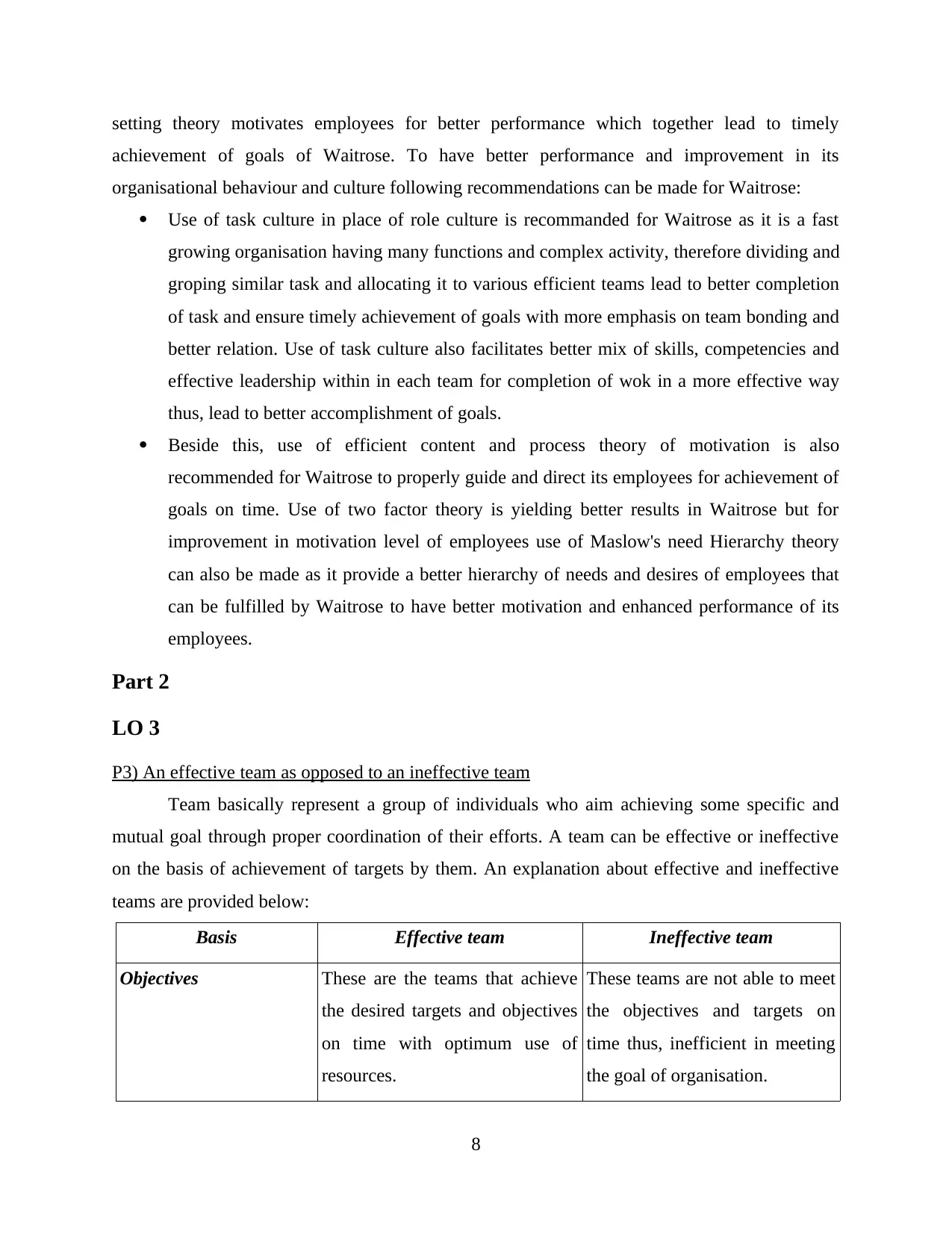
setting theory motivates employees for better performance which together lead to timely
achievement of goals of Waitrose. To have better performance and improvement in its
organisational behaviour and culture following recommendations can be made for Waitrose:
Use of task culture in place of role culture is recommanded for Waitrose as it is a fast
growing organisation having many functions and complex activity, therefore dividing and
groping similar task and allocating it to various efficient teams lead to better completion
of task and ensure timely achievement of goals with more emphasis on team bonding and
better relation. Use of task culture also facilitates better mix of skills, competencies and
effective leadership within in each team for completion of wok in a more effective way
thus, lead to better accomplishment of goals.
Beside this, use of efficient content and process theory of motivation is also
recommended for Waitrose to properly guide and direct its employees for achievement of
goals on time. Use of two factor theory is yielding better results in Waitrose but for
improvement in motivation level of employees use of Maslow's need Hierarchy theory
can also be made as it provide a better hierarchy of needs and desires of employees that
can be fulfilled by Waitrose to have better motivation and enhanced performance of its
employees.
Part 2
LO 3
P3) An effective team as opposed to an ineffective team
Team basically represent a group of individuals who aim achieving some specific and
mutual goal through proper coordination of their efforts. A team can be effective or ineffective
on the basis of achievement of targets by them. An explanation about effective and ineffective
teams are provided below:
Basis Effective team Ineffective team
Objectives These are the teams that achieve
the desired targets and objectives
on time with optimum use of
resources.
These teams are not able to meet
the objectives and targets on
time thus, inefficient in meeting
the goal of organisation.
8
achievement of goals of Waitrose. To have better performance and improvement in its
organisational behaviour and culture following recommendations can be made for Waitrose:
Use of task culture in place of role culture is recommanded for Waitrose as it is a fast
growing organisation having many functions and complex activity, therefore dividing and
groping similar task and allocating it to various efficient teams lead to better completion
of task and ensure timely achievement of goals with more emphasis on team bonding and
better relation. Use of task culture also facilitates better mix of skills, competencies and
effective leadership within in each team for completion of wok in a more effective way
thus, lead to better accomplishment of goals.
Beside this, use of efficient content and process theory of motivation is also
recommended for Waitrose to properly guide and direct its employees for achievement of
goals on time. Use of two factor theory is yielding better results in Waitrose but for
improvement in motivation level of employees use of Maslow's need Hierarchy theory
can also be made as it provide a better hierarchy of needs and desires of employees that
can be fulfilled by Waitrose to have better motivation and enhanced performance of its
employees.
Part 2
LO 3
P3) An effective team as opposed to an ineffective team
Team basically represent a group of individuals who aim achieving some specific and
mutual goal through proper coordination of their efforts. A team can be effective or ineffective
on the basis of achievement of targets by them. An explanation about effective and ineffective
teams are provided below:
Basis Effective team Ineffective team
Objectives These are the teams that achieve
the desired targets and objectives
on time with optimum use of
resources.
These teams are not able to meet
the objectives and targets on
time thus, inefficient in meeting
the goal of organisation.
8
Paraphrase This Document
Need a fresh take? Get an instant paraphrase of this document with our AI Paraphraser
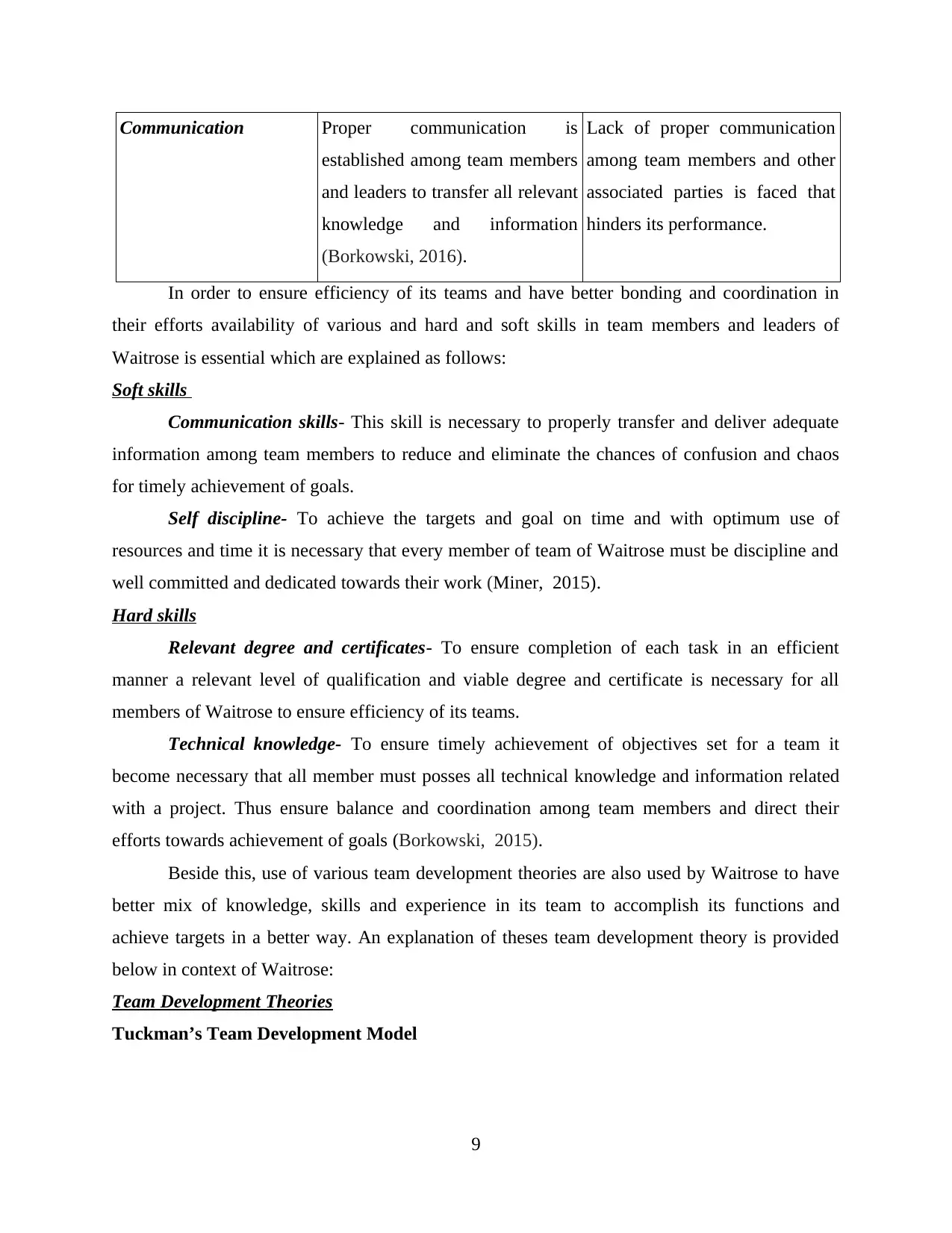
Communication Proper communication is
established among team members
and leaders to transfer all relevant
knowledge and information
(Borkowski, 2016).
Lack of proper communication
among team members and other
associated parties is faced that
hinders its performance.
In order to ensure efficiency of its teams and have better bonding and coordination in
their efforts availability of various and hard and soft skills in team members and leaders of
Waitrose is essential which are explained as follows:
Soft skills
Communication skills- This skill is necessary to properly transfer and deliver adequate
information among team members to reduce and eliminate the chances of confusion and chaos
for timely achievement of goals.
Self discipline- To achieve the targets and goal on time and with optimum use of
resources and time it is necessary that every member of team of Waitrose must be discipline and
well committed and dedicated towards their work (Miner, 2015).
Hard skills
Relevant degree and certificates- To ensure completion of each task in an efficient
manner a relevant level of qualification and viable degree and certificate is necessary for all
members of Waitrose to ensure efficiency of its teams.
Technical knowledge- To ensure timely achievement of objectives set for a team it
become necessary that all member must posses all technical knowledge and information related
with a project. Thus ensure balance and coordination among team members and direct their
efforts towards achievement of goals (Borkowski, 2015).
Beside this, use of various team development theories are also used by Waitrose to have
better mix of knowledge, skills and experience in its team to accomplish its functions and
achieve targets in a better way. An explanation of theses team development theory is provided
below in context of Waitrose:
Team Development Theories
Tuckman’s Team Development Model
9
established among team members
and leaders to transfer all relevant
knowledge and information
(Borkowski, 2016).
Lack of proper communication
among team members and other
associated parties is faced that
hinders its performance.
In order to ensure efficiency of its teams and have better bonding and coordination in
their efforts availability of various and hard and soft skills in team members and leaders of
Waitrose is essential which are explained as follows:
Soft skills
Communication skills- This skill is necessary to properly transfer and deliver adequate
information among team members to reduce and eliminate the chances of confusion and chaos
for timely achievement of goals.
Self discipline- To achieve the targets and goal on time and with optimum use of
resources and time it is necessary that every member of team of Waitrose must be discipline and
well committed and dedicated towards their work (Miner, 2015).
Hard skills
Relevant degree and certificates- To ensure completion of each task in an efficient
manner a relevant level of qualification and viable degree and certificate is necessary for all
members of Waitrose to ensure efficiency of its teams.
Technical knowledge- To ensure timely achievement of objectives set for a team it
become necessary that all member must posses all technical knowledge and information related
with a project. Thus ensure balance and coordination among team members and direct their
efforts towards achievement of goals (Borkowski, 2015).
Beside this, use of various team development theories are also used by Waitrose to have
better mix of knowledge, skills and experience in its team to accomplish its functions and
achieve targets in a better way. An explanation of theses team development theory is provided
below in context of Waitrose:
Team Development Theories
Tuckman’s Team Development Model
9
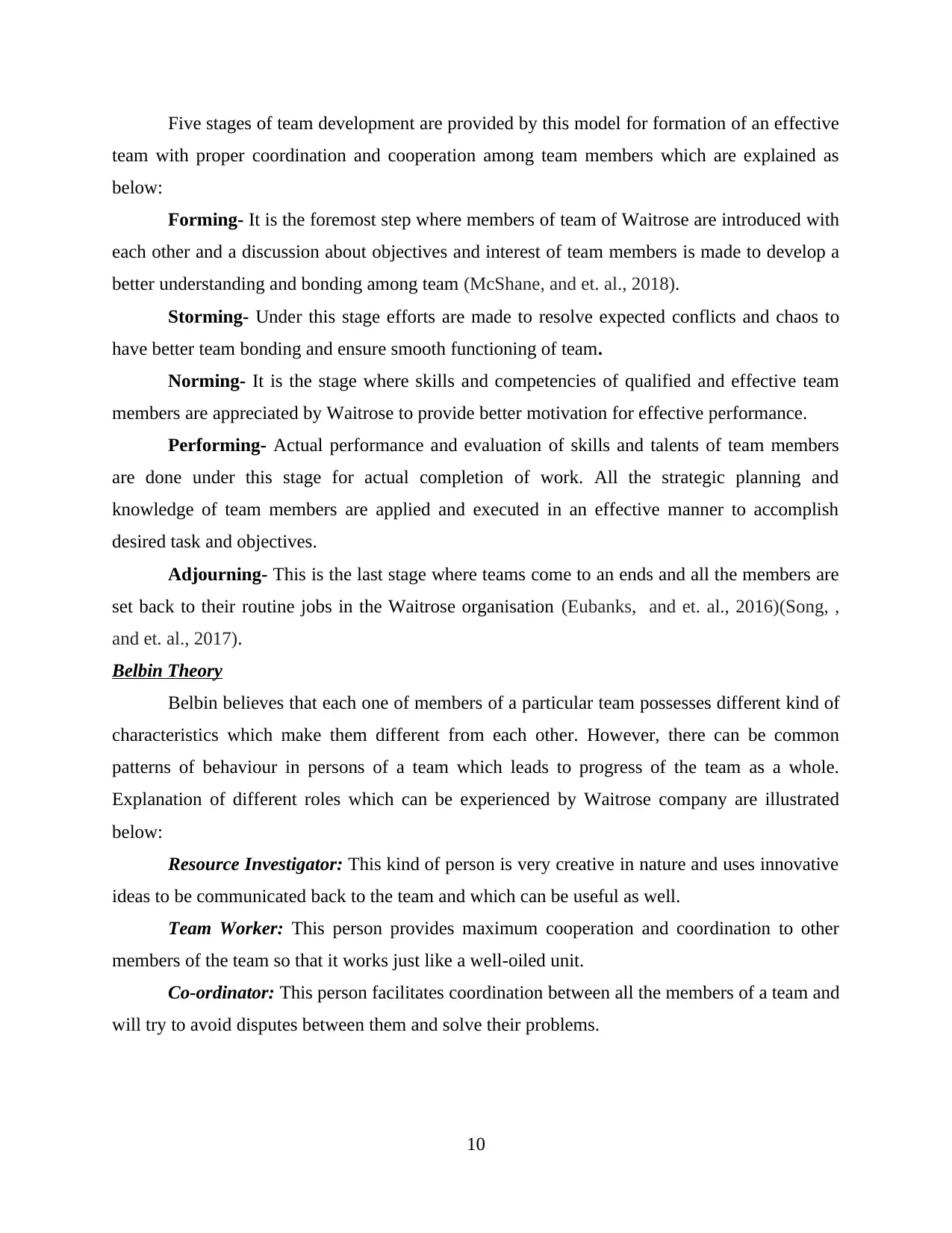
Five stages of team development are provided by this model for formation of an effective
team with proper coordination and cooperation among team members which are explained as
below:
Forming- It is the foremost step where members of team of Waitrose are introduced with
each other and a discussion about objectives and interest of team members is made to develop a
better understanding and bonding among team (McShane, and et. al., 2018).
Storming- Under this stage efforts are made to resolve expected conflicts and chaos to
have better team bonding and ensure smooth functioning of team.
Norming- It is the stage where skills and competencies of qualified and effective team
members are appreciated by Waitrose to provide better motivation for effective performance.
Performing- Actual performance and evaluation of skills and talents of team members
are done under this stage for actual completion of work. All the strategic planning and
knowledge of team members are applied and executed in an effective manner to accomplish
desired task and objectives.
Adjourning- This is the last stage where teams come to an ends and all the members are
set back to their routine jobs in the Waitrose organisation (Eubanks, and et. al., 2016)(Song, ,
and et. al., 2017).
Belbin Theory
Belbin believes that each one of members of a particular team possesses different kind of
characteristics which make them different from each other. However, there can be common
patterns of behaviour in persons of a team which leads to progress of the team as a whole.
Explanation of different roles which can be experienced by Waitrose company are illustrated
below:
Resource Investigator: This kind of person is very creative in nature and uses innovative
ideas to be communicated back to the team and which can be useful as well.
Team Worker: This person provides maximum cooperation and coordination to other
members of the team so that it works just like a well-oiled unit.
Co-ordinator: This person facilitates coordination between all the members of a team and
will try to avoid disputes between them and solve their problems.
10
team with proper coordination and cooperation among team members which are explained as
below:
Forming- It is the foremost step where members of team of Waitrose are introduced with
each other and a discussion about objectives and interest of team members is made to develop a
better understanding and bonding among team (McShane, and et. al., 2018).
Storming- Under this stage efforts are made to resolve expected conflicts and chaos to
have better team bonding and ensure smooth functioning of team.
Norming- It is the stage where skills and competencies of qualified and effective team
members are appreciated by Waitrose to provide better motivation for effective performance.
Performing- Actual performance and evaluation of skills and talents of team members
are done under this stage for actual completion of work. All the strategic planning and
knowledge of team members are applied and executed in an effective manner to accomplish
desired task and objectives.
Adjourning- This is the last stage where teams come to an ends and all the members are
set back to their routine jobs in the Waitrose organisation (Eubanks, and et. al., 2016)(Song, ,
and et. al., 2017).
Belbin Theory
Belbin believes that each one of members of a particular team possesses different kind of
characteristics which make them different from each other. However, there can be common
patterns of behaviour in persons of a team which leads to progress of the team as a whole.
Explanation of different roles which can be experienced by Waitrose company are illustrated
below:
Resource Investigator: This kind of person is very creative in nature and uses innovative
ideas to be communicated back to the team and which can be useful as well.
Team Worker: This person provides maximum cooperation and coordination to other
members of the team so that it works just like a well-oiled unit.
Co-ordinator: This person facilitates coordination between all the members of a team and
will try to avoid disputes between them and solve their problems.
10
⊘ This is a preview!⊘
Do you want full access?
Subscribe today to unlock all pages.

Trusted by 1+ million students worldwide
1 out of 19
Related Documents
Your All-in-One AI-Powered Toolkit for Academic Success.
+13062052269
info@desklib.com
Available 24*7 on WhatsApp / Email
![[object Object]](/_next/static/media/star-bottom.7253800d.svg)
Unlock your academic potential
Copyright © 2020–2026 A2Z Services. All Rights Reserved. Developed and managed by ZUCOL.





